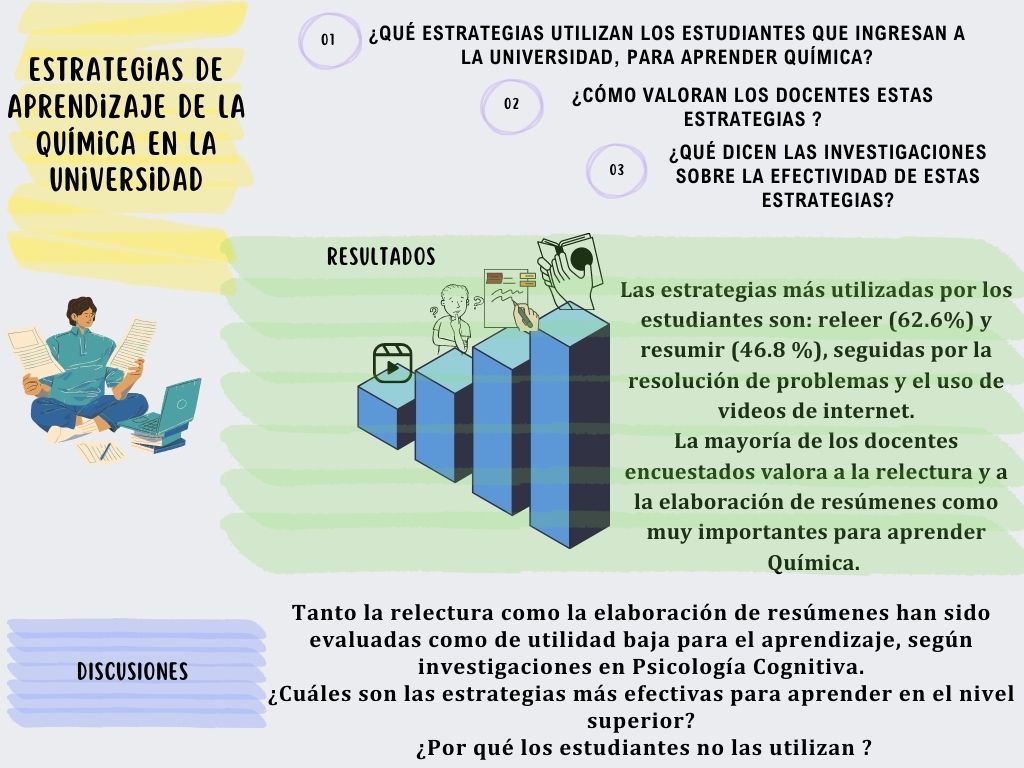Chemistry learning strategies in students entering university
Main Article Content
Abstract
The aim of this article is to show the results of an exploration of the learning strategies that first-year university students use when they study Chemistry on their own. 171 students from different careers from the Engineering Faculty of the Universidad Nacional del Comahue participated, who answered about what they do when they study Chemistry. On the other hand, their teachers were asked to assess the strategies reported by the students. The responses of students and teachers were categorized and related. The results show that the strategies most used by students are rereading and summarizing. While a high percentage of teachers valued these strategies as very important, there is discussion about the effectiveness of these strategies and the need to consider them in the teaching of Chemistry.
Article Details
Citas en Dimensions Service
References
Arteta, H. A., y Huaire, E. J. (2016). Estrategias metacognitivas y concepciones de aprendizaje en estudiantes universitarios. Horizonte de la ciencia, 6(11), 149–158.
Barraqué, F., Sampaolesi, S., Briand, L. E. y Vetere, V. (2021). La enseñanza de la química durante el primer año de la universidad: el estudiante como protagonista de un aprendizaje significativo. Educación química, 32(1), 58-73. https://doi.org/10.22201/fq.18708404e.2021.1.75760
Boekaerts, M., Zeidner, M., y Pintrich, P. R. (1999). Handbook of self-regulation. Elsevier.
Blasiman, R. N., Dunlosky, J., y Rawson, K. A. (2016). The what, how much, and when of study strategies: Comparing intended versus actual study behaviour. Memory, 25(6), 784-792. https://doi.org/10.1080/09658211.2016.1221974
Conejo-Flores, R., Cervantes-Barragán, D., García-González, J. M., y Flores-Morales, V. (2018). El rezago y abandono escolar en Ingeniería Química de la UAZ. Retos y expectativas. Journal of Energy, Engineering Optimization and Sustainability, 2(2), 37-48.
Dirkx, K. J. H., Camp, G., Kester, L., y Kirschner, P. A. (2019). Do secondary school students make use of effective study strategies when they study on their own? Applied Cognitive Psychology, 33(5), 952-957. https://doi.org/10.1002/acp.3584
Dunlosky, J., Rawson, K. A., Marsh, E. J., Nathan, M. J., y Willingham, D. T. (2013). Improving Students’ Learning With Effective Learning Techniques: Promising Directions From Cognitive and Educational Psychology. Psychological Science in the Public Interest, 14(1), 4–58. https://doi.org/10.1177/1529100612453266
Ernst, C., Arán Filippetti, V., y Lemos, V. (2022). Estrategias de aprendizaje y rendimiento académico: revisión sistemática en estudiantes del nivel secundario y universitario. Uniandes Episteme, 9(4), 534-562.
Ezcurra, A. M. (2019). Educación superior: una masificación que incluye y desiguala. En: Ezcurra, A. M (ed.), Derecho a la educación. Expansión y desigualdad: tendencias y políticas en Argentina y América Latina (pp. 21-52). Buenos Aires: Universidad Nacional de Tres de Febrero.
Hartwig, M.K.,y Dunlosky, J. (2012). Study strategies of college students: Are self-testing and scheduling related to achievement? Psychonomic Bulletin & Review, 19, 126–134. https://doi.org/10.3758/s13423-011-0181-y
Hartman, J. R., Nelson, E. A., y Kirschner, P. A. (2022). Improving student success in chemistry through cognitive science. Foundations of Chemistry, 24(2), 239-261. https://doi.org/10.1007/s10698-022-09427-w
Hernández Barrios, A. y Camargo Uribe, Á. (2017). Autorregulación del aprendizaje en la educación superior en Iberoamérica: una revisión sistemática. Revista Latinoamericana de Psicología, 49(2), 146–160. https://doi.org/10.1016/j.rlp.2017.01.001
Jones, R. M. (2023). The unexpected emotional cost of teaching chemistry in a pandemic. Frontiers in Education, 8, 1120385. https://doi.org/10.3389/feduc.2023.1120385
Lawson, M. J., Vosniadou, S., Van Deur, P., Wyra, M., y Jeffries, D. (2019). Teachers’ and Students’ Belief Systems About the Self-Regulation of Learning. Educational Psychology Review, 31(1), 223-251. https://doi.org/10.1007/s10648-018-9453-7
Lopez, E. J., Nandagopal, K., Shavelson, R. J., Szu, E., y Penn, J. (2013). Self‐regulated learning study strategies and academic performance in undergraduate organic chemistry: An investigation examining ethnically diverse students. Journal of Research in Science Teaching, 50(6), 660-676. https://doi.org/10.1002/tea.21095
Moreno, J. E., y Chiecher, A. C. (2019). Abandono en carreras de Ingeniería. Un estudio de los aspectos académicos, socio-demográficos, laborales y vitales. Cuadernos de Investigación Educativa, 10(2), 73-90. https://doi.org/10.18861/cied.2019.10.2.2908
Núñez, J. C., Solano, P., & González-Pienda, J. A. (2006). El aprendizaje autorregulado como medio y meta de la educación. Papeles del Psicólogo, 27, 139-146.
Panadero, E., & Alonso-Tapia, J. (2014). Teorías de autorregulación educativa: Una comparación y reflexión teórica. Psicología Educativa, 20(1), 11-22. https://doi.org/10.1016/j.pse.2014.05.002
Pérez-González, J. C., Filella, G., Soldevila, A., Faiad, Y., y Sanchez-Ruiz, M. J. (2022). Integrating self-regulated learning and individual differences in the prediction of university academic achievement across a three-year-long degree. Metacognition and Learning, 17, 1141–1165. https://doi.org/10.1007/s11409-022-09315-w
Pintrich, P. R. (1999). The role of motivation in promoting and sustaining self-regulated learning. International journal of educational research, 31(6), 459-470.
Rickey, D., y Stacy, A. M. (2000). The role of metacognition in learning chemistry. Journal of chemical education, 77(7), 915. https://doi.org/10.1021/ed077p915
Rosário, P., Pereira, A. S., Högemann, J., Nunez, A. R., Figueiredo, M., Núñez, J. C., Fuentes, S., & Gaeta, M. L. (2014). Autorregulación del aprendizaje: Una revisión sistemática en revistas de la base Scielo. Universitas Psychologica, 13(2), 781-798. https://doi.org/10.11144/Javeriana.UPSY13-2.aars
Theobald, M. (2021). Self-regulated learning training programs enhance university students’ academic performance, self-regulated learning strategies, and motivation: A meta-analysis. Contemporary Educational Psychology, 66, 101976. https://doi.org/10.1016/j.cedpsych.2021.101976
Torrano, F., Fuentes, J. L., y Soria, M. (2017). Aprendizaje autorregulado: estado de la cuestión y retos psicopedagógicos. Perfiles educativos, 39(156), 160-173. https://doi.org/10.22201/iisue.24486167e.2017.156.58290
Trías, D., y Huertas, J. A. (2020). Autorregulación en el aprendizaje. Manual para el asesoramiento psicoeducativo. Universidad Autónoma de Madrid. https://doi.org/10.15366/9788483447499
Trias, D., Huertas, J. A., Mels, C., Castillejo, I., y Ronqui, V. (2021). Autorregulación en el aprendizaje, desempeño académico y contexto socioeconómico al finalizar la escuela primaria. Revista Interamericana de Psicología, 2, 21. https://doi.org/10.30849/ripijp.v55i2.1509
van Rooij, E. C. M., Jansen, E. P. W. A., y van de Grift, W. J. C. M. (2018). First-year university students’ academic success: The importance of academic adjustment. European Journal of Psychology of Education, 33(4), 749-767. https://doi.org/10.1007/s10212-017-0347-8
Weinstein, C. E. y Mayer, R. E. (1986). The teaching of learning strategies. En: Wittrock, M.(Ed.), Handbook of Research on Teaching (pp. 315-327). Macmillan.

Educación Química por Universidad Nacional Autónoma de México se distribuye bajo una Licencia Creative Commons Atribución-NoComercial-SinDerivar 4.0 Internacional.
Basada en una obra en http://www.revistas.unam.mx/index.php/req.




